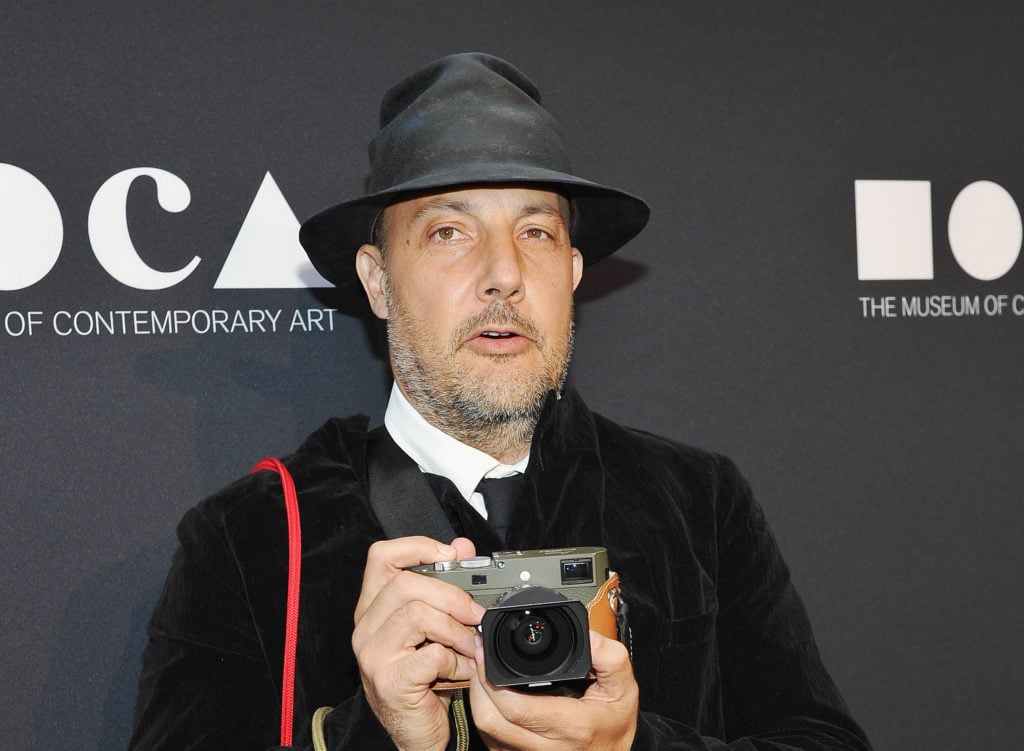Politics
Gallerist Stefan Simchowitz Is Running for the U.S. Senate. No, It’s Not Performance Art
Simchowitz is running as a Republican to fill the seat vacated by Dianne Feinstein.

Simchowitz is running as a Republican to fill the seat vacated by Dianne Feinstein.

Adam Schrader

The headline-making California art dealer Stefan Simchowitz is running for the U.S. Senate as a Republican to fill the seat vacated by the late Sen. Dianne Feinstein.
“I’m not making an artistic statement. I’m making a statement and the statement is that this country is in deep trouble and we need every person to make it better,” Simchowitz said in a phone interview. “No, this is not a joke, this is not some stupid art performance. This is a real thing.”
Stefan Simchowitz, the owner of Simchowitz Gallery in Los Angeles and once branded the art world’s “patron Satan,” announced his candidacy in an Instagram story, as reported by Annie Armstrong. He has joined a crowded field of Republicans—15 so far—who are vying for the seat. Democratic heavyweights including Reps. Adam Schiff and Katie Porter are also running for the Senate.
The gallerist said he doesn’t think of entering politics as a professional transition. “I think it’s additive. I don’t know if it’s helpful or not helpful to my art career, I have no idea. I haven’t really sort of equated that but I think it’s part of an art career because I think people in art should be interested in everything.”
When asked about whether he intends to champion any art-related policy, he answered: “I don’t think so, frankly.” He said he is more considered with broader policies and problems facing the country, such as increasing “the ability to live in a vibrant city full of people and not have all your wages garnished.”
“This country has always had inequality and poverty. But living in California, being assaulted daily with the homeless and unhoused populations and increasing unaffordability of everything, it’s something the artists I work with deal with and the people who work with me deal with,” said Simchowitz, who was born in South Africa. “What I want to effect affects everyone.”
Simchowitz is primarily focused on domestic monetary policy, having always had an interest in how the federal government operates fiscally, he said. In this matter, he said he is most impacted by a recent book he read by Stephanie Kelton titled The Deficit Myth: Modern Monetary Theory and the Birth of the People’s Economy. Kelton is a professor of economics and public policy at Stony Brook University.
“Modern monetary theory is central to my candidacy,” Simchowitz said. “We do not believe the federal deficit is a deficit. We believe it is just an accounting of how much money is in the system.”
Highlighting his other policies, he said he also doesn’t believe in student debt which he called “terrible for the population,” often sounding more like a Democrat than a Republican throughout the interview. “I believe in a woman’s right to choose. I’m a pro-choice Republican,” he added.
Simchowitz said he decided to run as a Republican to promote a more centrist platform—and outlined how it is more difficult to enter politics as a Democrat while his campaign manager, Jack Kimball, added, “Independents aren’t taken seriously.” There are three Independents in the U.S. Senate: Kyrsten Sinema of Arizona, Angus King of Maine, and Bernie Sanders of Vermont.
“We need to stop thinking of ourselves as a part of this or a party of that, but as a branch of government that can come together for the good of the people,” Simchowitz said. “We’re so far away from that.”
Simchowitz indicated he might have an advantage over other candidates vying for the seat because of his background in art.
“I deal primarily with younger artists. And those artists come from very poor and diverse backgrounds. Someone like me would not necessarily get an opportunity to hang out with such diverse people,” he said. “I think this has helped me understand the stresses of what regular people face. It enabled me to have a window into the lives of workers and laborers.”
Simchowitz said that Congress doesn’t necessarily need creative people to function, but he said artists and those in the art world “can help Congress understand what the needs of the people are.”
“When you’re around artists, you realize they come up with unusual solutions with limited resources, that’s what artists do. Solutions that are not the orthodoxy, I think, are fundamentally important in American politics and policymaking,” he said. “Theres an orthodoxy that’s hurting the country. We need creative thinking in government. We need entrepreneurial action in government.”
More Trending Stories:
Art Dealers Christina and Emmanuel Di Donna on Their Special Holiday Rituals
Stefanie Heinze Paints Richly Ambiguous Worlds. Collectors Are Obsessed
Inspector Schachter Uncovers Allegations Regarding the Latest Art World Scandal—And It’s a Doozy
Archaeologists Call Foul on the Purported Discovery of a 27,000-Year-Old Pyramid
The Sprawling Legal Dispute Between Yves Bouvier and Dmitry Rybolovlev Is Finally Over